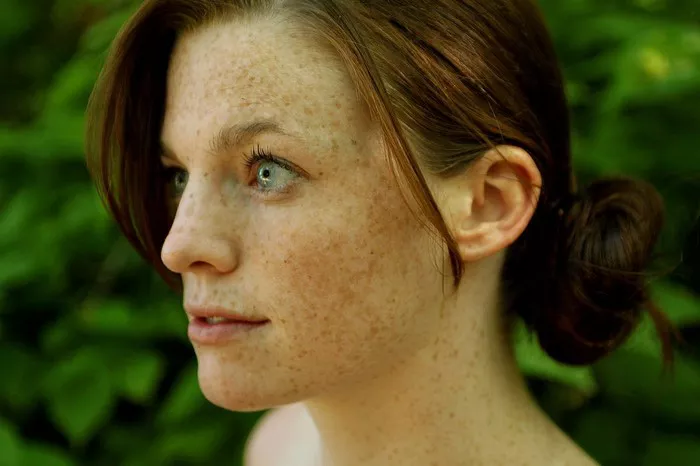Freckles are small, flat, brown spots that appear on the skin, often in areas that are exposed to the sun. While some people view freckles as a sign of beauty, others view them as a nuisance or even a health concern. One common question that people have about freckles is whether they get worse with age. In this article, we will explore the answer to this question, including the role of genetics, sun exposure, and other factors.
The Role of Genetics:
Genetics can play a significant role in the development of freckles. Some people are simply predisposed to developing freckles earlier in life or more prominently than others. This can be due to a variety of factors, including skin type, skin color, and the amount of melanin in the skin. However, while genetics can influence the development of freckles, they do not necessarily get worse with age.
Sun Exposure:
Sun exposure is one of the most common causes of freckles. The sun’s UV rays can cause the skin to produce more melanin, which can lead to the development of freckles. Additionally, sun exposure can cause other types of skin damage, including sunburns and an increased risk of skin cancer. While sun exposure can cause freckles to develop, they do not necessarily get worse with age.
Hormonal Changes:
Hormonal changes can also play a role in the development of freckles. For example, women may develop freckles during pregnancy or while taking hormonal birth control. Additionally, hormonal changes that occur during menopause can cause changes in the skin, including the development of freckles. However, while hormonal changes can cause freckles to develop, they do not necessarily get worse with age.
Other Factors:
Other factors that can contribute to the development of freckles include certain medications, skin injuries, and medical conditions such as autoimmune disorders. However, while these factors can cause freckles to develop, they do not necessarily get worse with age.
Prevention and Treatment:
While freckles themselves are not harmful, it is important to take steps to protect your skin from the sun and to monitor any changes in the appearance of your skin. These include:
Protecting your skin from the sun by wearing protective clothing, using a sunscreen with a high SPF, and avoiding prolonged sun exposure.
Monitoring any changes in the appearance of your skin, including the development of new freckles or changes in the color or shape of existing freckles.
Seeking medical attention if you notice any unusual changes in the appearance of your skin, including the development of new moles or freckles, changes in the color or shape of existing moles or freckles, or any other signs of skin cancer.
Using skin-lightening products to reduce the appearance of freckles, if desired.
Conclusion:
Freckles are a common skin condition that can be caused by a variety of factors, including genetics, sun exposure, hormonal changes, and other factors. While freckles themselves are not necessarily harmful, it is important to take steps to protect your skin from the sun and to monitor any changes in the appearance of your skin. While freckles may develop due to a variety of factors, they do not necessarily get worse with age. By protecting your skin from the sun, monitoring changes in your skin, and seeking medical attention if necessary, you can help ensure that your skin remains healthy and beautiful for years to come.
FAQs
1. Why am I getting more freckles as I get older?
As you age, factors such as sun exposure, hormonal changes, and genetics can contribute to the development of more freckles. Sun exposure, in particular, can stimulate melanocytes, the cells responsible for producing melanin, leading to the formation of new freckles or the darkening of existing ones. Hormonal changes, such as those associated with pregnancy or certain medications, can also affect melanin production and distribution, potentially causing an increase in freckles.
2. Why are my freckles getting worse?
Freckles may appear to worsen over time due to factors such as cumulative sun exposure, hormonal changes, or changes in skin texture and elasticity associated with aging. Sun exposure, in particular, can cause freckles to darken or become more prominent, especially if adequate sun protection measures are not taken. Additionally, hormonal fluctuations, such as those experienced during pregnancy or menopause, can influence melanin production and distribution, potentially affecting the appearance of freckles.
3. At what age do freckles fade?
Freckles may begin to fade or become less prominent with age, typically in adulthood or as a person enters their senior years. However, the timeline for freckle fading can vary widely among individuals and depends on factors such as genetics, sun exposure history, and skincare habits. While some people may notice a gradual reduction in freckles over time, others may retain their freckles throughout their lives.
4. When should I be worried about a freckle?
While freckles are generally harmless and benign, it’s essential to monitor them for any changes in size, shape, color, or texture, as these could be signs of skin cancer. You should be particularly vigilant if a freckle exhibits asymmetry, irregular borders, uneven coloring, or changes in diameter. Additionally, if a freckle becomes raised, itchy, or bleeds, it may warrant further evaluation by a dermatologist. If you have concerns about a freckle or notice any suspicious changes, it’s important to seek medical attention promptly for proper assessment and diagnosis.


